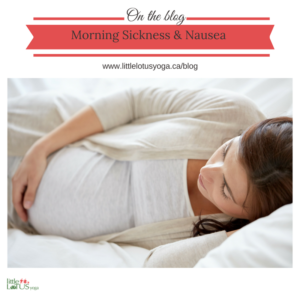Morning sickness, also known as “nausea and vomiting in pregnancy” (NVP,) is a condition that affects the majority of pregnant women. NVP is thought to be caused by the rising levels of the hCG hormone, which is necessary for the healthy development of the fetus.

Contrary to its name, “morning” sickness can actually occur at any time of the day. However, women usually experience worsening symptoms on an empty stomach – so morning can be a tricky time of the day! Many women also report more severe nausea in the evening.
Of the women who experience NVP in the first trimester, about half will begin to feel better by the second trimester. The rest will continue to experience symptoms for another month or so, and a small number of women will deal with NVP for the entire pregnancy. The condition “hyperemesis gravidarum” is characterized by extreme nausea and vomiting. Although rare, hyperemesis often requires treatment with medication or hospitalization for dehydration.
The majority of women will be able to cope with NVP by using certain tips and tricks, but it’s important to speak with a care provider if symptoms feel unmanageable. There is no “right” way to deal with NVP, and what works for one woman may not work for the next!
Tips and Tricks
Don’t let that tummy get empty!
For some reason, NVP worsens when women go a while without eating. Keep some dry crackers on the bedside table, and nibble on those before attempting to get out of bed in the morning. Carry snacks in your purse, and pull them out anytime that nagging “empty” feeling starts to threaten.
Smells and tastes
Certain smells will aggravate nausea, but some smells actually help an upset tummy. Many women have success with citrus – sniffing lemon, orange, grapefruit or lime. Sucking on citrus candies or lollipops (called Preggie Pops) can also help. Mint is another great flavor to try, and a lot of mothers will find relief with gum or mints.
Stay hydrated
It’s important to stay hydrated, especially when experiencing a lot of vomiting. Most women crave cold and carbonated drinks, so try some sparkling water or tap water with ice. Popsicles are also a huge hit, and can help to restore electrolytes if vomiting has been going on for a long time.
Be prepared
If you are experiencing vomiting, be prepared with plastic bags, tissues and wet wipes in your purse. Travel by car (if possible,) if public transit exacerbates symptoms. And don’t forget that most people are sympathetic to pregnant women – there’s no need to feel embarrassed if the sickness hits in a public place!
Medication
If none of these tips help it may be time to consider medication. Diclectin is the most common drug prescribed to women with NVP, and is usually taken when nausea and vomiting are having an impact on a woman’s daily life (i.e. she’s no long able to continue with normal daily activities.) Speak with your care provider if you’re having concerns about your ability to cope.
It’s important for women to remember that they’re not alone. The majority of pregnant women will experience nausea, and many also deal with vomiting. Talk to friends and family members for advice. Also take time to rest and recover if NVP is preventing you from working or going about your daily activities. Most likely it will pass in the second trimester, and you will recover your strength and stamina!
For specific questions or concerns, contact the Motherisk Helpline at 1-877-439-2733 or visit http://www.motherisk.org/

With my first child and I also had morning sickness morning, noon and night. I had to call in sick a couple of times because I felt like it was so unbearable. Unlike you, I was throwing up all day. All I could suggest is to drink No to morning sickness tea to ease your belly. It was the only remedy worked for my sickness.